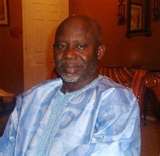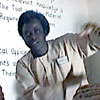 |
|
| Author |
 Topic Topic  |
|
|
kondorong

Gambia
4380 Posts |
 Posted - 25 May 2007 : 22:36:44 Posted - 25 May 2007 : 22:36:44


|
We are trying to set up one giving small loans like IBAS used to do. We dont want to make mistakes already realised by others. Any input will be most welcomed.
We might abandon it if it will not work. Perhaps loans to raise chickens, goats and sheep for tobaski and have village compettions etc
|
|
|
inez

279 Posts |
 Posted - 25 May 2007 : 23:36:03 Posted - 25 May 2007 : 23:36:03


|
| I think that will be a good idea, hope it will work out. |
 |
|
|
Santanfara

3460 Posts |
 Posted - 25 May 2007 : 23:36:08 Posted - 25 May 2007 : 23:36:08



|
quote:
Originally posted by kondorong
We are trying to set up one giving small loans like IBAS used to do. We dont want to make mistakes already realised by others. Any input will be most welcomed.
We might abandon it if it will not work. Perhaps loans to raise chickens, goats and sheep for tobaski and have village compettions etc
kondo , i am not experience in micro-finance but if the policy is for the beneficiaries to repay the soft loan then it need a careful planning and implementation. the fisrt step is may be for your organisation to conduct a mini-feasibility study on how serious the villagers would be in honouring any future aggerreement . then from that result you can start up with a handful of trusted individuals by giving out a minimal amount .from the onset it need to be clear to them that this is not freebey or charity .a time table for repayment ,a village coordinator ,accassional visits by a senior representative etc.
i know that muslim hands a u.k charitable organisation helps women in kombos and rural arears with chicken farming and income for small businesses .the amounts range from £200 to little bit more .for them they don't expect any thing in return . one may find out there banjul representative for further advice .but go ahead kondo ,give the help . |
Surah- Ar-Rum 30-22
"And among His signs is the creation of heavens and the earth, and the difference of your languages and colours. verily, in that are indeed signs for men of sound knowledge." Qu'ran
www.suntoumana.blogspot.com |
 |
|
|
jambo

3300 Posts |
 Posted - 28 May 2007 : 15:09:40 Posted - 28 May 2007 : 15:09:40


|
| i agree on santanfara, on thsi one, think carefully and plan long term. |
 |
|
|
njucks
Gambia
1131 Posts |
 Posted - 28 May 2007 : 23:30:12 Posted - 28 May 2007 : 23:30:12


|
quote:
Originally posted by kondorong
We are trying to set up one giving small loans like IBAS used to do. We dont want to make mistakes already realised by others. Any input will be most welcomed.
konds please go ahead and dont be afraid of mistakes,i think micro finance in whatever form. IBAS, by NGOs, CVOs government etc has proven that the poor are credit worthy and can participate in a cash economy.
but i personally think there is something still missing and perhaps still a gap between what is being offered and conventional finance. i think this is what u need to find before u start as others have advised.
i hope this helps |
 |
|
|
Lily
United Kingdom
422 Posts |
 Posted - 28 May 2007 : 23:49:04 Posted - 28 May 2007 : 23:49:04


|
I think this is a very good idea - the idea of loans is a good one because the person receiving it does not feel as if they are having to accept charity but rather they are part of a business deal. Have given some loans so far and have found out the following:
1. People are serious about it
2. Repayments need to be manageable and over a period of time (obvious I know - but a small amount over 6 months is easier than a larger amount over 3)
3. Be flexible - have a meeting half way through the loan period to discuss progess: everyone then has a voice and you can re-adjust the re-payments if it is necessary - or make a bigger loan if things are going well..
4. Make it open - so everyone knows and there are no secrets: others can aspire to it and no one feels excluded...
5,. Never, ever, lend anything you can't afford to lose.... no matter how many papers are
signed, life sometimes gets in the way - and lenders (in this kind of situation) have to lend because they think it's a good idea - not because they are going to gain...
So far I have not been disappointed - although some re-payemtns are taking SO much longer than originally thought.......
Go for it and good luck
|
 |
|
|
ylowe

USA
217 Posts |
 Posted - 29 May 2007 : 01:24:50 Posted - 29 May 2007 : 01:24:50


|
Kondorong,
THIS IS A PAPER I WROTE AWHILE AGO ABOUT MICROLENDING AND I HOPE IT IS USEFUL TO YOU. REMEMBER KOBO GOT "GALAJE" NOW SO DONT YOU MISS WITH HIM. LAUGH
Micro-lending: The growing trend of micro Lending in poor nations.
Most people in poor nations do not see banking as a way of solving their daily problems. In an environment where prices are sky rocketing banks are less likely to lend to businesses and individuals. As an economics student, I immediately think about all of the untapped economic potential that lies in the billions of poverty stricken individuals across the globe. How can we harness this potential to improve their quality of life? One man has come up with an ingenious strategy that is turning thousands of such people into viable entrepreneurs and thereby getting them out of the so called “poverty trap”. That man is Muhammad Yunus, head of economics at Bangladesh's Chittagong University.
The story began in 1974, Yunus recounted, when he could no longer tolerate "teaching about elegant fields of economics" in the midst of people who were literally starving to death all around Chittagong University. He compiled a list of 42 people who suffered higher interest rates at the hands of lenders and discovered that the total amount of money they needed was a mere $27. "I realized that it was within my capability to solve the problem, so I gave the money, the $27, and got them liberated from the clutches of the money lenders," Yunus recalled. "This created such excitement among the people in the village that I wanted to continue. I said to myself, if you can make so many people happy with such a small amount of money, why shouldn't you do more of it?"
Mr. Yunus started a bank in one of the world’s poorest countries and started making differences in the lives of the poor. He gave loans to individuals who lack collateral, steady employment and verifiable credit history and therefore cannot meet even the most minimum qualifications to gain access to traditional credit. He busted the business model of every major bank that came before him by challenging the “truism” that poor people were not credit-worthy, and he did it with trust and hand-shake loans. He gave the highest priority to the people who need the loan the most. The poorer you are the more likely you are to get a loan. This decision was based on the belief that these people had a desire to build a life for themselves.
When Yunus was unable to persuade the local bank to loan money to the poor, he offered himself as the guarantor. "I started signing papers, taking money from the bank, and giving it to people for entrepreneurial activities. It worked perfectly," he told the audience at the May 19 conference organized by the Center for Global Business and the Economy at the Stanford Graduate School of Business. "People were paying back 100 percent without a problem." So encouraged was he by the success of the project that in 1983, Yunus set up his own independent institution, Grameen Bank, and continued to expand micro lending throughout the country. Today, the bank has 3.5 million borrowers, 95 percent of whom are extremely poor women, and has given out more than $4 billion worth of loans at a 99 percent recovery rate.
Vinod Khosla, founding CEO of Sun Microsystems and a partner at the venture capital firm Kleiner Perkins, calls it "one of the most important economic phenomena since the advent of capitalism and Adam Smith." Compare this to charity or a donation that does not have to be paid back. Mr. Yunus realized that a loan taught the borrower a lot more and therefore created a more powerful and independent person. The gained pride, strength and confidence in their abilities when they successfully paid off a micro loan. Then they were ready for the next step financially. His solution to world poverty, founded on the belief that credit is a fundamental human right, is brilliantly simple: loan poor people money on terms that are suitable to them, teach them a few sound financial principles, and they will help themselves. “ If you give a man a fish and he will eat for a day. If you teach a man to fish, he will eat for a life.” This is exactly what Yunus did and in 2006, he was honored with a Noble Peace prize.
Women are the center focus of many micro credit institutions and agencies worldwide. The reasoning behind this is the observation that loans to women tend to benefit the whole family than loans to men do. I t has also been observed that giving women the control and the responsibility of small loans raises their socio economic status. Women also benefits from the higher social status when they can generate income. Over the past three decades, the practice of lending as little as $50 to poor, self employed individuals, the vast majority of them women, has proved it’s sustainability through near perfect repayment rates. Plus, the short-term loans turn over several times a year, lifting tortilla makers in Mexico and basket weavers in Benin out of poverty along the way. Microfinance institution tripled the number of borrowers to 27 million from 1997 to 2001 and they are still reaching only a few percentage of their target audience. The poverty rate in Bangladesh has decreased 25% since Grameen began it’s micro lending practices, and it is on target to reach 50% by 2015.
Micro credit is not just for poor countries. Accion San Diego, a non- profit organization in the U.S. state of California is dedicated of providing micro-loans to small entrepreneurs and businesses, who are often on the margin of the business community. They have a delinquency and default rate of five percent. So micro lending as also helping eradicating poverty within our own borders. Since 1986, the Women Self- Employment project in Chicago has loaned $1.3 millions in micro credit and it started as a peer group modeled on the Grameen bank program. In Canada, over the past 25 years, the total number of self- employed workers has risen 106.4% since 1989, three quarters of all job growth has been in self employment. Micro lending has significantly impacted their economy.
The method used were very similar to the mutual and cooperative finance models developed in poor communities in Britain and elsewhere in the 19th century, but they had fallen out of favor as big banks and big development had taken over. Since then Grameen has spread globally where its ideas have been adopted in a lot of poor countries today. Micro lending helps to overcome barriers by enabling access to economic resources that help people create their own employment. Through providing access to small amount of credit, many small ventures can grow into successful businesses. Micro lending enables individuals with determination to increase their economic independence through self employment. One particular smart move on Yunus’ part was requiring borrowers to form small groups and thereby sharing the financial risk involved.
Many commercials banks in developing countries are beginning to examine the micro- finance market. During the last five years, their exploration of this new market has been facilitated by donor- funded loan guarantees and specialized technical assistance. The experience of private commercial banks in micro- finance is still relatively limited. Nonetheless, a few patterns are emerging, and a number of challenges continue to require attention. The challenges faced by microfinance in the world, first and urgent are in organization and system level, and then at technology and methodology level.
Most of the people receiving micro loans are from the informal sector and the informal sector has a big role to play in the development of people in rural areas of the world. It has to be supported so that it can be strong and bring development in the rural areas. Evidence shows that the informal sector can contribute to economic development and when balanced with the formal sectors can lead to economic growth. In areas where there are shortfalls with the formal sector it can be used so that employment can be created and people can continue to develop economically. Donations are great, but social entrepreneurs needs to get involved more to drive funds to the cause. It may be the greatest solutions yet to help end world poverty.
The long term future and potential of micro lending programs throughout the world remains uncertain. Yunus made a strong case for giving the poor a hand up, rather than a handout. This man deserves the Noble Peace prize for helping eradicate poverty in some of the world’s most impoverished nations.
|
 |
|
|
ylowe

USA
217 Posts |
 Posted - 29 May 2007 : 01:28:23 Posted - 29 May 2007 : 01:28:23


|
| Kondorong, please dont lend to the guys sitting at the bantaba in yoro bawol instead give it to females and in groups. bye |
 |
|
|
jambo

3300 Posts |
 Posted - 29 May 2007 : 10:01:49 Posted - 29 May 2007 : 10:01:49


|
i agree with ylowe lend to the womens groups. also remember that for some cultures lending is taboo, but please do it. it is needed
|
 |
|
|
Karamba

United Kingdom
3820 Posts |
 Posted - 29 May 2007 : 17:35:49 Posted - 29 May 2007 : 17:35:49


|
Kondorong,
Although REPAYMENT is generally seen as performance indicator in micro finance, experience has it that 100% repayment may not always be a full proof of success in lending. Some times recovery methods are rather agressive and small ventures repay only to start all over again without required working capital. That is common in Gambia. Is your goal to give credit and have it repaid with interest or do you plan to have your beneficiaries retain some earning for growth and expansion of their ventures? |
Karamba |
Edited by - Karamba on 29 May 2007 19:11:15 |
 |
|
|
kondorong

Gambia
4380 Posts |
 Posted - 29 May 2007 : 19:05:00 Posted - 29 May 2007 : 19:05:00


|
Karamba
These are interest free loans of D5000.00 payable over a period of 2 years. I think thats ok given that Banks are charging 25 to 27% interest.
Ylowe
Charity begins at home.People in Yoro Bawol will have to get  Rememeber i am vying for alkaloship someday. Rememeber i am vying for alkaloship someday.
Honestly, we would like to lend to women who are very keen in developing themselves and repay for the most part better than men. Like Youssou Ndour said in his song BAI KAT: " SU TAWEH, SU TAWUT, NYU FAYI BORR. SAY SAY SAY SAY TAY JAMBARR YEH..." (Meaning farmers pay theiR loans whether there is a good or bad harvest.
nJUKS
Thanks for the advice. Well apreciated form an economic guru.
Thanks to all of you Lily, Jambo, Inez and Santafarang |
 |
|
|
jambo

3300 Posts |
 Posted - 31 May 2007 : 11:45:26 Posted - 31 May 2007 : 11:45:26


|
kons, thought this might help
http://allafrica.com/stories/200705300916.html
Gambia: Entrepreneurship, Micro-Finance Project Launched
The Daily Observer (Banjul)
30 May 2007
Posted to the web 30 May 2007
Musa Ndow
African Development Bank, in collaboration with the government of The Gambia yesterday launched on Enterpreneurship Promotion and Micro -Finance Development Project (EP&MFDP) at a ceremony held at the Kairaba Beach Hotel in Senegambia.
This project seeks to help reduce socio-economic imbalances in the country by increasing social and economic opportunities for the poor and vulnerable groups through diversifying income generating sources, and improving access to financial services. It is geared towards supporting entrepreneurship, small and micro- enterprise development, as well as micro finance.
Delivering his launching remark, Baboucarr Jallow, Permanent-Secretary Department of State for Finance and Economic Affairs (DOSFEA), said the project was designed to build on the successes in poverty reduction and strengthen the Social Development Fund (SDF) on its transformation, and re-focus strategic programmes. Mr Jallow informed the gathering that the government has shifted emphasis on the provision of social services as an end, considering it as a means to enhancing the productive capabilities of communities against poverty. "By this project, it is hoped that poverty reduction at micro level will be mainstreamed into our national efforts towards economic development, the achievement of the MDGs, as well as the goals of Vision 2020," he added. He thanked the ADB and its staff for the support.
In her presentation, Sunita Pitamber, lead expert from the Vice President's Office said the project was designed through extensive consultation and review, both at the country level and within the bank. She said this design was based on the explicit need to increase rural and urban employment, to empower emerging and existing entrepreneurs to benefit from improving market and regional trade conditions and to provide a conducive environment for economic growth.
Ms Sunita noted that the project comprised three components, which are enterpreneurship and market development, micro- finance scheme and project management.
Other presenters at the launching included Alasana Jitteh, Fund Manager of SDF, Madina Assouman, Technical Portfolio Manager at the Micro Finance Unit of the UNCDF, and George Thomas, Chairman of SDF, who chaired the occasion. |
 |
|
|
Santanfara

3460 Posts |
 Posted - 08 Jun 2007 : 12:27:11 Posted - 08 Jun 2007 : 12:27:11



|
| micro finance helping lots of women in egpt as well. kondo should try to let us know what is the lates development with his intended project. i am getting interested as well. may be for my village. |
Surah- Ar-Rum 30-22
"And among His signs is the creation of heavens and the earth, and the difference of your languages and colours. verily, in that are indeed signs for men of sound knowledge." Qu'ran
www.suntoumana.blogspot.com |
 |
|
| |
 Topic Topic  |
|
|
|
| Bantaba in Cyberspace |
© 2005-2024 Nijii |
 |
|
|

